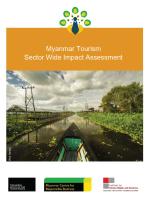
Sector-Wide Impact Assessment of Myanmar’s Tourism Sector
The Myanmar Tourism Sector-Wide Impact Assessment (SWIA) puts detailed information on potential impacts of the sector into the public domain for uptake and use by a wide range of audiences. It assesses not only localised and cumulatives impacts on individuals and groups that may arise from tourism in specific locations, but also the sector’s potential impacts on Myanmar society as a whole and the choices to be made.
The SWIA approach was developed by the Myanmar Centre for Responsible Business (MCRB) in partnership with its co-founders, the Institute of Human Rights and Business (IHRB) and the Danish Institute of Human Rights (DIHR), and is intended to support responsible business practices in growing sectors of Myanmar’s economy. SWIA is a forward-looking assessment that aims to contribute to preventing and minimising the sector’s negative impacts as well as strengthening and improving the sector’s positive impacts.
This is important because:
- Myanmar is currently facing a rapid increase in tourist arrivals which has the potential to create significant positive impacts for job creation and poverty alleviation. However some of Myanmar’s flagship sites such as Bagan, Inle and Kyaiktiyo, are already under environmental and social pressure from the effects of tourism, which is affecting the livelihoods of local inhabitants and long-term viability of these places as tourism destinations.
- Even though the country is emerging from decades of ethnic conflict, authoritarian rule and economic isolation it is, and will remain for some time, a high-risk country with poor governance. An understanding of the potential impacts of the sector is necessary to improve the outcomes for Myanmar and its people.
- Responsible business conduct in the Tourism sector in Myanmar therefore requires enhanced due diligence to determine what impacts business activities may have on society, including on human rights. This must include robust approaches to managing those impacts. The Tourism SWIA is intended to be a resource for these efforts.
The SWIA makes recommendations to government, businesses, civil society groups, tourists and other stakeholders intended to increase positive impacts and reduce negative impacts, building on the framework of existing government policies for responsible tourism and community involvement in tourism (CIT). The recommendations are directed towards government, businesses (and investors in those business), civil society, tourists, the Myanmar National Human Rights Commission and development partners for Myanmar, and are intended to support wider multistakeholder collaboration.
We strive to make the pdf versions of our publications etc. accessible for screen readers. If you experience any problems, please contact Digital Editor Stine Juhl Nielsen on stni@humanrights.dk
